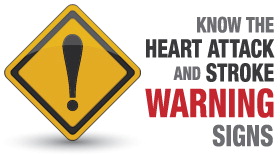Be F.A.S.T. for February, American Heart Month
Know the warning signs of a stroke so you can react F.A.S.T.
 According to the American Stroke Association, only two out of three Americans know at least one of the stroke warning signs. Yet stroke is the fourth killer for all Americans and the number one preventable cause for disability. A stroke occurs when a blood vessel that carries oxygen and nutrients to the brain either bursts, ruptures or is blocked by a clot. As a result, the brain cannot get the blood and oxygen it needs and pieces of the brain dies. Michigan State University Extension recommends that you know the signs of a stroke and act F.A.S.T. to recognize the symptoms that come on suddenly. Some of the most common symptoms are listed below.
According to the American Stroke Association, only two out of three Americans know at least one of the stroke warning signs. Yet stroke is the fourth killer for all Americans and the number one preventable cause for disability. A stroke occurs when a blood vessel that carries oxygen and nutrients to the brain either bursts, ruptures or is blocked by a clot. As a result, the brain cannot get the blood and oxygen it needs and pieces of the brain dies. Michigan State University Extension recommends that you know the signs of a stroke and act F.A.S.T. to recognize the symptoms that come on suddenly. Some of the most common symptoms are listed below.
F - Face drooping: Does one side of the face droop or is it numb? Ask the person to smile. Is the person's smile uneven?
A - Arm weakness : Is one arm weak or numb? Ask the person to raise both arms. Does one arm drift downward?
S - Speech difficulty: Is speech slurred? Is the person unable to speak or hard to understand? Ask the person to repeat a simple sentence, like "The sky is blue." Is the sentence repeated correctly?
T - Time to call 9-1-1: If someone shows any of these symptoms, even if the symptoms go away, call 9-1-1 and get the person to the hospital immediately. Check the time so you'll know when the first symptoms appeared.
The American Heart Association (AHA) states that to help prevent heart disease one needs to follow a healthy diet and lifestyle as listed below:
- Choose lean meats and poultry without skin and prepare them without added saturated and trans fat.
- Select fat-free, one percent fat and low-fat dairy products.
- Cut back on foods containing partially hydrogenated vegetable oils to reduce trans fat in your diet.
- Cut back on foods high in dietary cholesterol. Aim to eat less than 300 milligrams of cholesterol each day.
- Cut back on beverages and foods with added sugars.
- Choose and prepare foods with little or no salt. Aim to eat less than 1,500 milligrams of sodium per day. Educate yourself and learn more about limiting sodium .
- If you drink alcohol, drink in moderation. That means one drink per day if you’re a woman and two drinks per day if you’re a man.
- Follow the AHA recommendations when you eat out, and keep an eye on your portion sizes.



 Print
Print Email
Email
